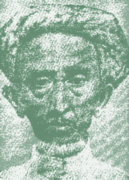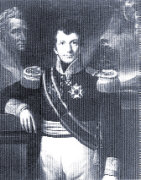800 : The Aghlabid rule is established in North Africa.
803 : Downfall of the Barmakids. Execution of Jafar Barmki.
805 : Campaigns against the Byzantines. Capture of the islands of Rhodes and Cypress.
1940 | |
| May 10 Germany invades the Netherlands. May 15 The Netherlands surrenders to Germany; Dutch government flees to London. Netherlands Indies government declares a state of siege, and places the Indies on a wartime footing. German citizens in the Netherlands Indies are placed in internment camps. June Young Suharto enters the KNIL military school at Gombang. June 28 Japan says that it wants to renegotiate trade agreements with the Netherlands. July Indonesian exports to Japan are stopped. August Japan suggests that French Indochina and the Netherlands Indies should be incorporated willingly into the "East Asia Co-Prosperity Sphere". August 9 GAPI presents another petition for the "complete democratization of Indonesia". August 23 Commission for the Study of Constitutional Reforms is set up to look into the GAPI demands (but nothing else). Thamrin and others in the Volksraad withdraw their proposals for democratization, saying that the situation was becoming hopeless. September Japanese troops move into French Indochina. September 12 Netherlands Indies government begins trade talks with a Japanese delegation under Kobayashi. Van Mook does not cooperate with Japanese demands for aviation fuel. October 26 Japan and the Netherlands issue a joint declaration that the Indies will not be part of the "Co-Prosperity Sphere". November 12 Quota on oil sales to Japan from the Indies is set by agreement. December Kobayashi returns to Japan. | Even after the Netherlands had been taken over by Nazi Germany, the Dutch still held onto their colonies. For over a year and a half, the Netherlands East Indies government continued to rule over Indonesia, reporting to the Dutch government-in-exile. Efforts by Indonesian activists to organize self-rule were ignored. Some Japanese extremists had talked about building an empire in the Pacific in the early 1930s, or even earlier. In 1940, however, Japan still faced a possible military threat from the Soviet Union, and the Japanese military was unwilling to overextend their forces too far to the south. |
1911 | |
| Abendanon publishes R. A. Kartini's letters with the title "Door Duisternis Tot Licht". Newspaper al-Munir begins publishing in Padang. Bubonic plague outbreak on Java. | Throughout history, the bubonic plague had never before spread to Java. Tens of thousands died of the plague in 1911-1913, and it was twenty-five years before the disease was eradicated from Java again, after extensive campaigns against rats. |
1912 | |
| September 10 Sarekat Dagang Islamiyah changes name to Sarekat Islam under Tjokroaminoto. Indische Partij is founded by Setiabudi (Douwes Dekker), Dr. Cipto Mangunkusumo and Ki Hajar Dewantoro. All three are exiled within a year. Portuguese suppress revolt in East Timor. November 18 Kyai Haji Ahmad Dahlan founds Muhammadiyah in Yogya. Dutch send another military expedition to the Tanimbar Islands. |  Kyai Haji Ahmad Dahlan, founder of Muhammadiyah. The Muhammadiyah remains one of the large, respected Islamic organizations in Indonesia today. It has been known for its "modernist" Islamic viewpoint. |
1830 | |
| Johannes van den Bosch arrives as the new Governor-General, begins the "cultuurstelsel" or "culture system". Forced cultivation of indigo is introduced in the Priangan. First steamboat arrives in the Indies. Nederlands Zendelinggenootschap (Dutch Missionary Society) begins offering education to "native" children. December 4 Van den Bosch officially organizes the Dutch forces from the Java War into the Oost-Indische Leger, or "East Indies Army" (later KNIL). | |
1831 | |
| Nederlands-Indië government manages a balanced budget. Dutch forces fighting the Padri in Sumatra reach the Bonjol area. U.S. ships shell coastal villages in Aceh in an action against piracy. |  Gov.-Gen. Johannes van den Bosch It was only after the Java War that the Dutch began to think about a real empire in the Indies. From 1830 to the end of the century, the Dutch began a drive to take complete control of the areas from Aceh to New Guinea, and to extract as much profit as possible from the valuable areas, such as the Priangan area of West Java. Revenues from the Indies paid for as much as one-third of the Dutch government's budget in the mid-1800s. These monies helped to finance the industrialization and development of the Netherlands in the 1800s. The burden fell especially upon the Netherlands Indies, since the Dutch had lost many of their other colonies to the British during the Napoleonic wars (including South Africa and Sri Lanka), and since Belgium with its business and industry broke away from the Kingdom of the Netherlands in 1830. The government was called the Netherlands Indies, or Nederlands-Indië in Dutch, or Hindia Belanda in Indonesian today. |
1800 | |
| VOC formally dissolved on January 1; properties revert to Dutch government. Sultan of the Kraton Kanoman in Cirebon is banished to Ambon by the Dutch. A low-level rebellion breaks out under Bagus Rangen. | During these times, the Netherlands was allied to or occupied by Napoleon's France. Until Daendels arrived, not all Dutch officials in the Indies approved of the government in Amsterdam. Around this time, many ports and markets that had been monopolized by the VOC were opened to free trade. This turned out to be profitable for the local government, which then allowed the Netherlands Indies officials to be more independent of the Napoleonic government in Amsterdam (until events of war reduced trade around 1807-1808). |
1801 | |
| British take control of the Minahasa region, remaining until 1816. | |
1802 | |
| Melaka and Maluku are returned from British to Dutch control by the Treaty of Amiens. Dutch begin sending military reinforcements to Java. | |
1670 | |
| VOC establishes outposts at Bengkalis (across the straits from Melaka) and Perak, both for controlling the trade in tin. Balambangan in easternmost Java becomes independent of Balinese rule. | |
about 100 | |
| "Dvipantara" or "Jawa Dwipa" kingdom is reported by Indian scholars to be in Java and Sumatra. Prince Aji Saka introduces writing system to Java based on scripts of southern India. Hindu kings rule the area around Kutai on Kalimantan. "Langasuka" kingdom founded around Kedah in Malaya. | |
about 130 | |
| Salaka or Salanka kingdom, Salakanegara, is founded in West Java. | |
 | ||||
| Manioc (Manihot esculenta) |